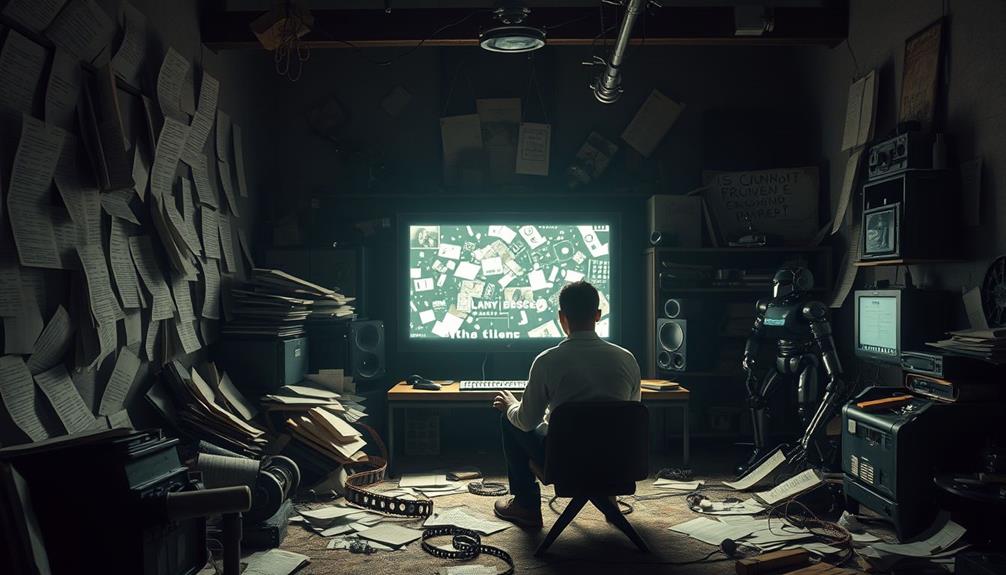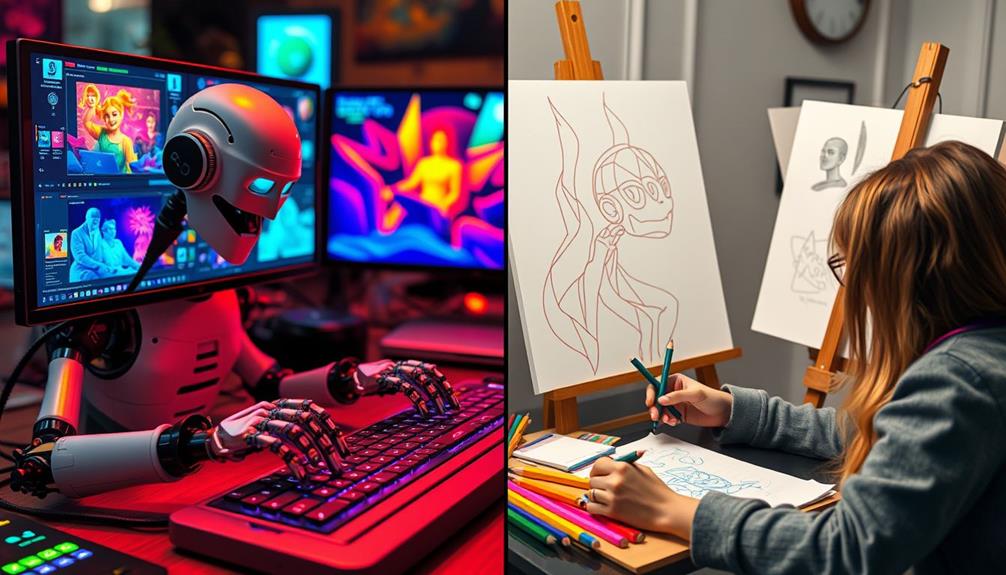AI-generated content in entertainment offers both exciting advantages and notable drawbacks. On one hand, it speeds up scriptwriting and production, cutting costs and fostering innovative storytelling. You can reach audiences more effectively with personalized content analytics. However, this technology also risks homogenizing creativity, as AI often lacks emotional depth. There's concern about job displacement and ethical issues surrounding ownership rights. Additionally, biases in AI models can perpetuate stereotypes. Balancing AI's capabilities with human creativity is essential. Want to explore the intricate details of these dynamics further? You'll find plenty to ponder ahead.
Key Takeaways
- AI-generated content improves efficiency in scriptwriting and production, saving time and costs for creators and studios alike.
- While AI fosters innovative storytelling, it often lacks emotional depth, impacting audience engagement and connection.
- Ethical concerns arise regarding copyright ownership and the potential for job displacement in the entertainment industry.
- AI's reliance on existing data can perpetuate biases, leading to homogenized narratives and a lack of diversity in content.
- The rapid generation of AI content raises risks of misinformation, highlighting the need for strict guidelines and fact-checking measures.
Overview of AI-Generated Content
AI-generated content has quickly taken center stage in the entertainment industry, transforming how creators develop and deliver their work. This innovative approach encompasses various forms—scripts, marketing materials, and promotional content—initiated by user inputs like keywords and topics.
With the integration of AI tools, you'll find that content creation has become faster and more efficient, allowing for quicker editing processes and streamlined production. Furthermore, AI technologies can enhance targeted marketing and personalized content, providing insights into audience preferences that were previously difficult to access.
However, as you explore this evolving landscape, you can't ignore the growing concerns surrounding originality and quality. The potential for homogenization in creative outputs could dilute the unique voices that define human creativity.
Additionally, the reliance on AI-generated content raises important ethical discussions around copyright ownership. Who owns the work created by AI? Is it the user, the programmer, or the AI itself?
These questions highlight the complexities of incorporating AI in the entertainment industry. While AI tools can analyze audience preferences and trends, offering targeted marketing and personalized content, they also challenge traditional notions of creativity and ownership.
Balancing the benefits of production efficiency with these ethical considerations is essential as you navigate this new frontier in entertainment.
Advantages of AI in Entertainment

The integration of AI in entertainment brings a host of advantages that can profoundly improve production processes. With AI technology, you can streamline tasks like scriptwriting, storyboarding, and video editing, allowing projects to be completed faster and within budget. By automating routine processes, you save time and reduce the need for multiple specialists, which leads to significant cost savings for studios and independent creators alike.
Furthermore, AI influences composition and production processes, allowing for innovative approaches to storytelling and sound design, which can enhance the overall quality of entertainment content AI influences composition.
AI tools also excel in content generation, offering unique ideas and storylines that foster creativity. This collaboration between AI and human writers results in innovative content that keeps audiences engaged. Additionally, AI enhances audience engagement by providing personalized content recommendations, improving viewer satisfaction and retention.
In addition, AI's ability to analyze data and trends aids in developing targeted marketing strategies. This means studios can reach wider audiences and optimize their digital marketing efforts effectively.
Disadvantages of AI in Entertainment

While AI brings efficiency to entertainment production, it also presents significant drawbacks that can undermine creativity and artistic expression. AI-generated content often lacks the emotional depth and nuanced storytelling that only human creators can provide, making it challenging to connect with audiences on a personal level. This can lead to formulaic narratives that fail to resonate with audiences, relying instead on repetitive themes and predictable formats.
Additionally, the emotional manipulation tactics often seen in narcissistic behaviors can mirror the way AI attempts to engage users, as it may prioritize engagement over authenticity and emotional truth recognizing dangerous narcissistic behaviors.
Moreover, the rise of automation raises concerns about job displacement within the entertainment industry. As AI tools reduce the need for traditional roles, emerging artists and creatives may find fewer opportunities to showcase their talents.
Intellectual property issues also complicate the landscape, as questions arise about ownership and rights over AI-generated works. This ambiguity can create tension between creators and producers, further stifling innovation.
Additionally, AI's reliance on existing data may perpetuate biases, skewing representations in media and negatively impacting audience perceptions. As platforms lean more on AI-generated material, they risk homogenizing content, leading to a lack of diversity in storytelling that could disengage viewers.
In short, while AI offers benefits, it poses risks that can diminish the richness of entertainment.
Ethical Considerations

As you explore the ethical considerations of AI-generated content, you'll notice significant risks like misinformation and propaganda that can distort public perception.
The rapid advancement of technology necessitates a closer examination of cybersecurity challenges that may arise as AI systems become more integrated into content creation.
Copyright and ownership issues further complicate the landscape, raising questions about who truly owns AI-created works.
Additionally, biases in AI outputs can lead to harmful stereotypes, making it essential to address these challenges responsibly.
Misinformation and Propaganda Risks
Increasingly, AI-generated content poses significant risks for spreading misinformation and propaganda in the entertainment industry. This technology can create persuasive narratives without the need for factual accuracy or human oversight, which raises ethical concerns.
When AI tools aggregate data from biased sources, they often perpetuate stereotypes and misinformation, leading to distorted entertainment narratives that mislead audiences.
The rapid generation of content by AI means unchecked or misleading information can spread quickly, especially in fast-paced news cycles and on social media platforms. You might find yourself consuming content that seems credible but is, in fact, rooted in falsehoods.
To combat this, organizations and creators need to implement strict guidelines and fact-checking measures, ensuring they don't accidentally promote harmful propaganda or false narratives.
Accountability and transparency in AI-generated material are essential for maintaining trust within the entertainment industry. Without these measures, the potential for AI to produce highly convincing yet false content becomes a significant concern.
As both creators and consumers, we must remain vigilant against the risks posed by AI-generated misinformation and advocate for ethical practices in content creation.
Copyright and Ownership Issues
The rise of AI-generated content not only raises concerns about misinformation but also ignites complex discussions around copyright and ownership. The intersection of AI and copyright is becoming increasingly significant as metrics track visitor engagement, which can influence perceptions of content value.
You might wonder who owns the rights to material created by machines compared to human creators. This question leads to legal challenges, as existing copyright laws often struggle to address the nuances introduced by AI involvement.
The potential for copyright infringement escalates since AI tools aggregate and reassemble existing works, raising the specter of plagiarism if proper attribution isn't maintained. You may find this particularly troubling, as it could undermine the efforts of human creators who rely on their original ideas.
The lack of clarity in ownership rights for AI-generated content underscores the urgent need for new regulations and frameworks. These regulations should aim to protect both human creators and the integrity of AI-generated works.
Ethical considerations also come into play, emphasizing the necessity for transparency in AI algorithms to prevent misrepresentation in creative outputs. As you navigate this evolving landscape, keeping these issues in mind will be vital for ensuring a fair balance between innovation and the protection of artistic rights.
Bias in AI Outputs
Bias in AI outputs poses significant ethical challenges in the domain of entertainment. When you use AI-generated content, you might unknowingly perpetuate biases embedded in the training data. This often results in skewed representations of gender, race, and other demographics, favoring certain perspectives while marginalizing others.
Historical data typically contains systemic biases, which can lead to a lack of diversity in the narratives being produced. Furthermore, systems that lack sensitivity to emotional complexities, such as those seen in the dynamics of relationships, can further exacerbate these biases by misrepresenting character motivations and experiences.
As you engage with AI tools, ethical concerns arise if these tools prioritize efficiency over inclusivity. This can undermine the representation of underrepresented groups in creative works, limiting the richness of stories told. A lack of diversity in datasets can contribute to a homogenization of content, making it harder for unique voices to break through.
It's essential to advocate for transparency in AI algorithms and take active measures to mitigate biases. By doing so, you can help guarantee equitable and diverse content creation in entertainment.
Embracing these efforts not only enriches the industry but also promotes a more inclusive environment where all voices can be heard and represented.
Impact on Creativity

With AI stepping into the domain of content creation, it's reshaping how we think about creativity in entertainment. AI can enhance your storytelling by generating unique ideas and storylines, allowing you, as a human writer, to dive deeper into emotional connections and character development.
For instance, the dynamic between celebrities, such as Jennifer Aniston and Jon Hamm's on-set chemistry, showcases the importance of human interaction in storytelling. However, while AI can churn out content rapidly, it often lacks the emotional intelligence and nuanced understanding that you bring to the table. This can lead to gaps in audience engagement, as the richness of narratives may fall short.
Moreover, relying too heavily on AI tools might result in homogenized content, with algorithms regurgitating existing material and stifling diversity in creative expression. AI's inability to innovate independently highlights a critical limitation—trends and concepts often stem from human insight and cultural context, not machines.
That said, collaboration between AI and human creatives can create a dynamic environment where technology amplifies your creativity rather than replacing it. By maintaining creative integrity, you can harness the strengths of AI while preserving the unique touch only human writers can offer, paving the way for innovative storytelling that resonates with audiences.
Job Market Implications

How will the rise of AI in entertainment reshape the job market for creatives? The integration of AI-generated content brings significant challenges and opportunities.
While automation can streamline tasks like scriptwriting and editing, it raises concerns about job displacement, especially for lower-level positions. You might find that many emerging artists face fewer opportunities as studios lean towards AI to cut costs and boost efficiency.
This shift towards automation mirrors trends in other industries, such as finance, where the benefits of converting to Gold IRAs reveal the growing importance of adapting to new economic conditions.
Consider these implications:
- Job Security: Traditional roles in the entertainment industry may diminish, leading to uncertainty for many creatives.
- Job Displacement: Automation can replace tasks that were once solely human, streamlining production.
- Upskilling: To remain competitive, you'll need to adapt by learning AI tools and technologies.
- Creativity: While AI can assist, it can't fully replace the unique perspective and innovation that human creators bring.
- Historical Context: The Writers Guild of America has previously highlighted tensions around job security, which are only intensifying with AI's rise.
Navigating this evolving landscape requires not just creativity, but also a proactive approach to skill development in an increasingly automated world.
Future of AI in Content Creation

As we look ahead, the future of AI in content creation promises to transform the landscape of entertainment in unprecedented ways. With advancements in technology, AI-generated content is set to cater to individual viewer preferences, enhancing user engagement like never before.
The industry will benefit from automation in various production processes, from scriptwriting to marketing, greatly boosting efficiency and reducing costs. Additionally, the rise of AI tools can lead to more targeted marketing strategies, similar to email marketing tools for Salesforce, allowing creators to reach their ideal audience more effectively.
As AI evolves, it could pave the way for new genres and innovative storytelling methods, broadening the entertainment options available to audiences. This growth, however, raises important discussions about balancing efficiency with artistic integrity. It's crucial to establish ethical frameworks guiding responsible AI implementation in content creation.
The collaboration between AI and human creatives is expected to spark innovative breakthroughs. By harnessing the strengths of both, you can enjoy a richer tapestry of content that maintains the quality and uniqueness of artistic expression.
The future looks bright for filmmakers and content creators, as the integration of AI enhances creativity while also streamlining the production process. Embracing this change could redefine how stories are told, making entertainment more dynamic and personalized than ever.
Balancing AI and Human Input

Maneuvering the evolving landscape of entertainment requires a delicate balance between AI and human input. While AI tools can help automate tasks like script generation and video editing, it's crucial to guarantee that human creativity remains at the forefront.
This balance is increasingly important as industries seek to integrate new technologies, such as those seen in AI Software Engineer Jobs, to enhance creative processes. After all, the emotional depth and unique perspectives that only human writers can provide are essential to resonating with audiences.
To achieve this balance, consider the following:
- Prioritize collaboration between AI and human writers for innovative breakthroughs.
- Use AI insights to understand audience preferences and trends, but rely on human intuition for emotional connections.
- Avoid over-reliance on AI that leads to homogenized content lacking originality.
- Focus on upskilling in AI technologies to effectively leverage these tools while maintaining artistic integrity.
- Foster an environment where technology complements creativity rather than replaces it.
Frequently Asked Questions
What Are the Cons of AI in the Entertainment Industry?
AI in entertainment can lead to formulaic content, risking emotional depth and creativity. It may displace jobs, raise ethical concerns over ownership, and foster skepticism about authenticity, ultimately eroding trust in the industry's artistic integrity.
What Are the Cons of AI in Content Creation?
When you consider AI in content creation, you'll notice it often lacks emotional depth and originality. This can lead to clichéd narratives, potential job loss for creatives, and ongoing debates about copyright and ownership rights.
What Are the Pros and Cons of AI in Film?
You'll find that AI in film boosts efficiency and creativity, allowing for innovative storytelling. However, it can threaten jobs and raise ethical concerns about ownership and bias, making you question its long-term impact on the industry.
What Are the Disadvantages of AI in Theatre?
AI in theatre can stifle emotional depth, leading to formulaic scripts. You might find productions lack uniqueness and cultural sensitivity, raising ethical concerns over ownership rights and threatening job opportunities for emerging writers and creatives.
Conclusion
As you navigate the shifting landscape of entertainment, think of AI as a double-edged sword—its sharp edge can cut through tedious tasks, while its dull side risks dulling the human spark. Balancing AI's efficiency with your creativity is like harmonizing a melody; together, they can create a symphony. Embrace this partnership, and let the rhythm of innovation guide you, ensuring that both technology and artistry flourish in a world where stories continue to captivate hearts.










